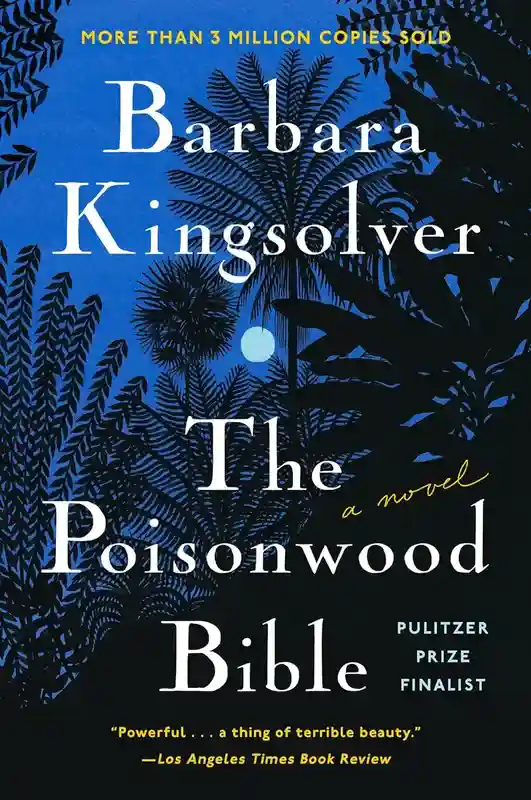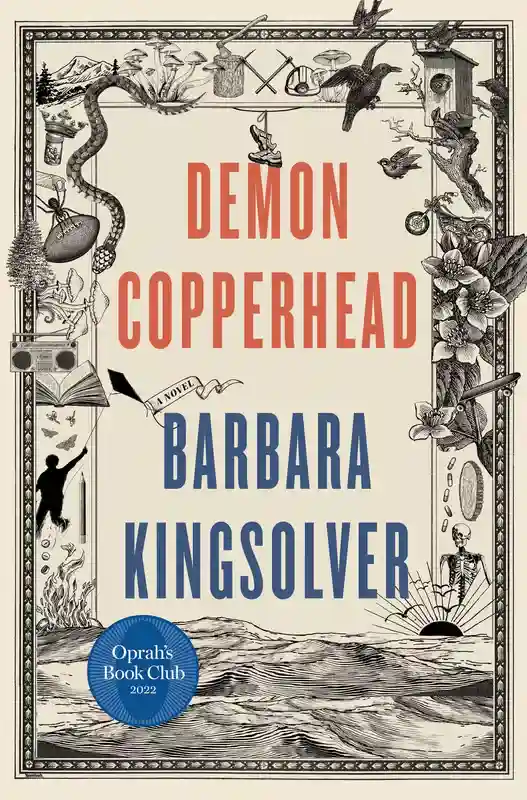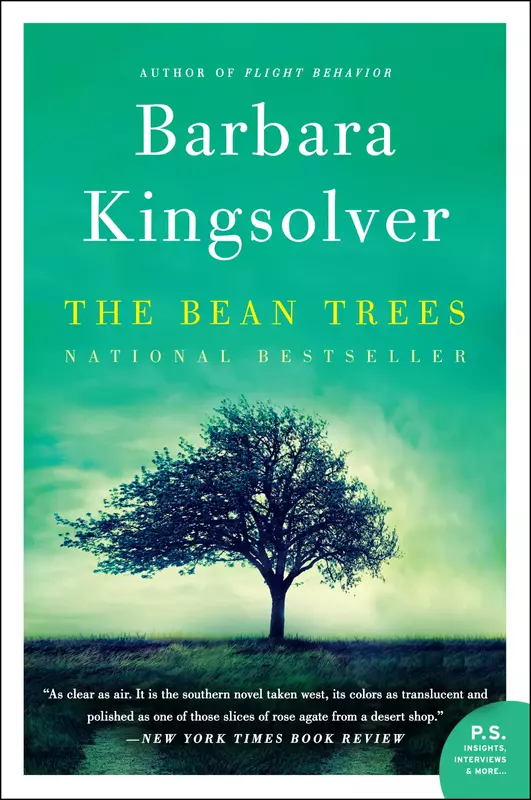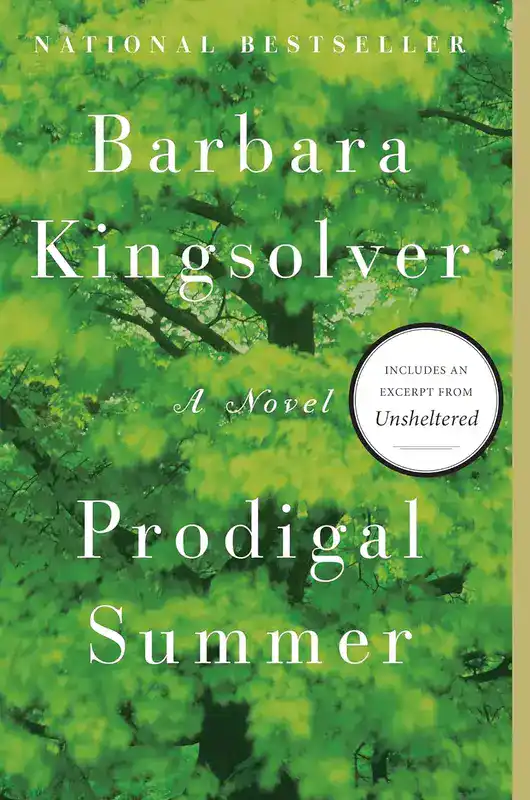This post may contain affiliate links. Read more here.
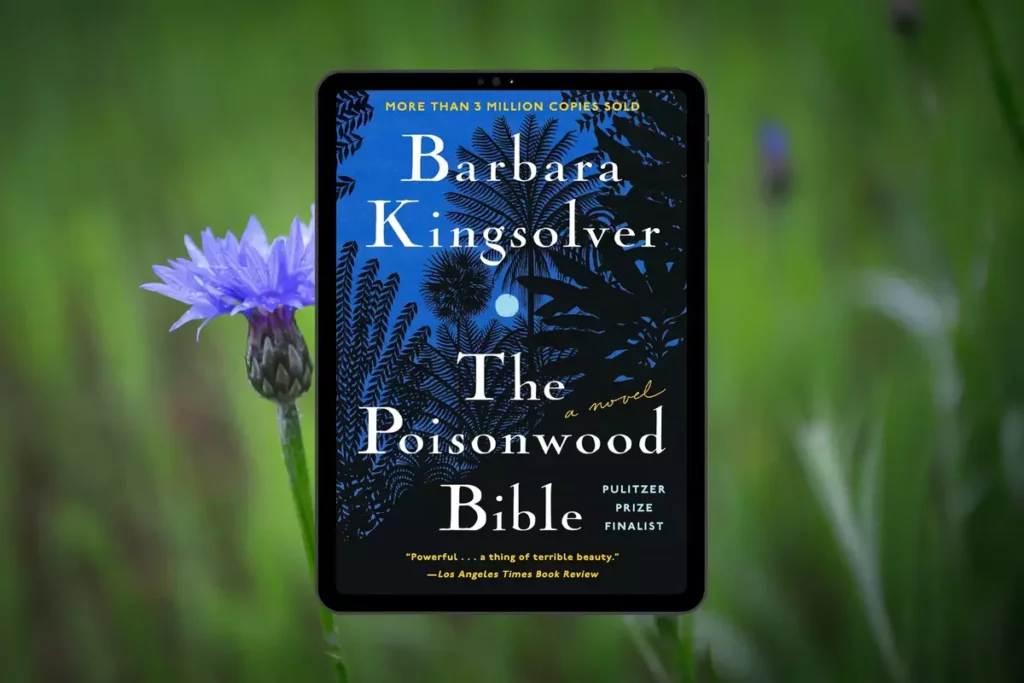
Book club questions for The Poisonwood Bible by Barbara Kingsolver explore the themes of colonialism, cultural clash, family dynamics, religious fanaticism, the resilience of the human spirit, and more.
As one of the best novels by Barbara, you will find its characters are compelling, its plot is suspenseful, and its historical backdrop more than impressive.
I loved this novel! It made me laugh and cry and care and think – isn’t that what all good fiction should do?
What are your thought on this book? ✨
The Poisonwood Bible by Barbara Kingsolver
In this blog post I have prepared the discussion questions for The Poisonwood Bible by Barbara Kingsolver.
At the bottom of this post I also have some additional suggestions for others novels by Barbara, as well as PDF with printable discussion question you can use with your book clubs. I suggest printing them out, and taking your time with every question as there’s lot to unpack!
Book Club Questions | Additional Recommendations | Printable PDF
About the Story
The Poisonwood Bible tells the story of the Price family, who embark on a mission trip to the Belgian Congo in 1959. Led by their evangelical and determined father, Nathan Price, the family carries their beliefs and belongings to Africa, hoping to make a difference. However, their journey takes a tragic turn as they face the harsh realities of African soil, including political unrest, cultural clashes, and personal struggles.
Narrated by Orleanna Price, the mother, and her four daughters—Rachel, Leah, Adah, and Ruth May—the story unfolds against the backdrop of the Congo’s fight for independence from Belgium. The family grapples with loss, questions about their own roles in the unfolding events, and the challenges of adapting to a vastly different environment. Each daughter copes with their father’s mission in unique ways, leading them on separate paths toward understanding and redemption.
The novel explores themes of religion, politics, race, sin, and redemption, offering a poignant exploration of moral choices and personal responsibility. Through the voices of the Price family members, the book delves into the complexities of their experiences in Africa, painting a vivid picture of their struggles and transformations over the course of three decades.
About the Author
Barbara Kingsolver, born in 1955 and raised in rural Kentucky, is a celebrated author known for her insightful storytelling and deep connection to nature. With degrees in biology from DePauw University and the University of Arizona, she embarked on a journey that led her to various corners of the world, including England, France, Africa, and South America.
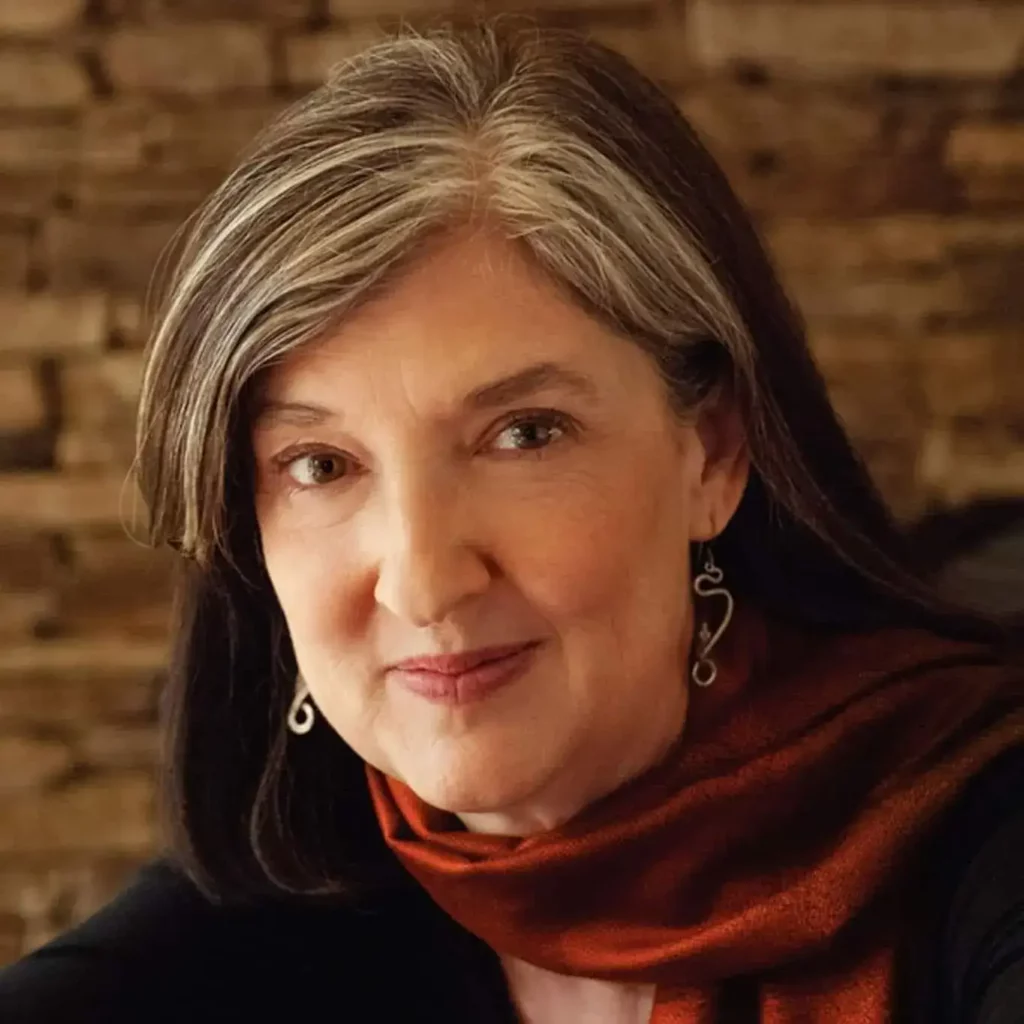
Since 1985, Kingsolver has been a prolific writer, contributing to the literary world with a diverse range of works, including novels, short stories, essays, and poetry. Her most renowned book, The Poisonwood Bible, gained international acclaim and was a finalist for the Pulitzer Prize and the Orange Prize.
Kingsolver’s writing often delves into themes of social and environmental issues, reflecting her background in biology and her passion for the natural world. In 2000, she received the National Humanities Medal, a testament to her significant contributions to the arts. Some of her other works include Demon Copperhead, Unsheltered, and Prodigal Summer.
Apart from her literary accomplishments, Kingsolver is also recognized for her advocacy and service. She established the Bellwether Prize for Fiction, supporting new literary voices, and later transformed it into the PEN/Bellwether Prize for Socially Engaged Fiction.
Currently residing on a farm in southern Appalachia with her husband, Steven Hopp, who teaches environmental studies, Kingsolver books have been translated into multiple languages and have become essential reading in high schools and colleges, cementing her legacy as one of the most influential writers of the 20th and 21st centuries.
Book Club Questions for The Poisonwood Bible
Disclaimer: the following discussion questions contain spoilers, so proceed with caution if you haven’t finished the book yet.
- How does the Price family dynamic change over the course of the novel? How does each family member cope with the challenges they face in the Congo, and how do these challenges shape their relationships with one another?
- The story is narrated from the perspectives of Orleanna and her four daughters. How do these multiple narrators enhance or alter your understanding of the events in the novel? Whose perspective did you find most compelling, and why?
- Explore the novel’s portrayal of religion, particularly Nathan Price’s evangelical beliefs. How does his unwavering faith impact the family and their interactions with the Congolese people? What commentary do you think the author is making about religious zealotry?
- What significance does the title phrase, “the poisonwood bible,” hold in the context of the main characters’ lives and the novel’s central themes? How does the origin of this phrase play a crucial role in understanding its implications within the story?
- Barbara Kingsolver carefully crafts the distinct voices of the Price sisters. How does each sister’s perspective provide insights into her personality, relationships with others, especially their parents, and their experiences in Africa? How does the narrative effect change when seen through the sisters’ eyes?
- The Kikongo word “nommo” carries profound meanings related to being and naming. What parallels can be drawn between nommo and Christian beliefs? How do the sisters’ Christian names and their Kikongo names reflect their individual traits and behaviors?
- Characters in the novel have diverse beliefs about justice. Leah, in particular, reflects on her understanding of justice. How do different characters define justice, and do you think any true justice prevails by the novel’s conclusion?
- Adah, Leah, and Rachel each arrive at their own philosophies of life. What story does Adah believe in, and how does it differ from the beliefs of her sisters? How would you characterize their respective life philosophies, and which, if any, do you find most compelling?
- Several characters face moments of redemption or self-realization. Which characters do you believe experience redemption, and what leads to these moments of change? Are there characters who do not find redemption, and why?
- Discuss the cultural clash between the Price family, representing Western ideals, and the Congolese people. How does this clash manifest in various aspects of the story, including language, customs, and traditions? What does the novel reveal about the complexities of cultural understanding and acceptance?
- Each of the Price daughters undergoes significant personal growth. How do Leah, Adah, Rachel, and Ruth May evolve throughout the novel? What pivotal moments contribute to their development, and how do their experiences in the Congo shape their identities?
- Consider the backdrop of political events in the Congo during the 1950s and 1960s. How does the political climate influence the characters’ lives and decisions? What impact do colonialism and the fight for independence have on the narrative?
- Explore the symbolism in the novel, such as the poisonwood tree itself. What does the tree represent, and how does it reflect the larger themes of the story? Are there other symbols that stood out to you, and what do they signify?
- Barbara Kingsolver tackles complex social, political, and environmental issues in this novel. How does her perspective as an author influence the way these themes are portrayed? Do you think the novel presents a balanced view of these issues, or does it lean in a particular direction?
- How do various characters embody different forms of balance or imbalance? Are specific characters associated with particular types of balance? Does any sister ultimately convey the importance of balance?
- Explore the cultural, social, and religious disparities between Africa and America as portrayed in the novel. To what extent do Orleanna and her daughters grasp these differences? What do you think Kingsolver is trying to convey regarding these cultural distinctions?
- Nathan Price, the family patriarch, does not have a voice of his own in the narrative. What insights do we gather about his beliefs and actions through his wife and daughters? Is it crucial to understand his perspective, or does the story gain depth without it?
- What types of captivity and freedom are examined in the novel? How do various characters experience and cope with these emotions? What are the underlying causes and outcomes of each?
- The novel concludes with ambiguity, as the carved-animal woman denies the existence of certain villages. What do you interpret from this ambiguous ending, and how does it reflect the broader themes of the novel?
- The novel has received both praise and criticism for its portrayal of Christianity and the Western perspective. How did your own beliefs and background influence your reading experience? Did your opinions about the characters or the story change as you progressed through the novel?
Other Books by Barbara Kingsolver
Hope you enjoyed the book club discussion questions and reading guide for The Poisonwood Bible by Barbara Kingsolver.
Here are some more of my book club recommendations related to this book:
Demon Copperhead by Barbara Kingsolver
Set in the mountains of southern Appalachia, Demon Copperhead is the story of a boy born to a teenaged single mother in a single-wide trailer, with no assets beyond his dead father’s good looks and copper-colored hair, a caustic wit, and a fierce talent for survival.
Relayed in his own unsparing voice, Demon braves the modern perils of foster care, child labor, derelict schools, athletic success, addiction, disastrous loves, and crushing losses. Through all of it, he reckons with his own invisibility in a popular culture where even the superheroes have abandoned rural people in favor of cities.
Many generations ago, Charles Dickens wrote David Copperfield from his experience as a survivor of institutional poverty and its damages to children in his society. Those problems have yet to be solved in ours. Dickens is not a prerequisite for readers of this novel, but he provided its inspiration.
In transposing a Victorian epic novel to the contemporary American South, Barbara Kingsolver enlists Dickens’ anger and compassion, and above all, his faith in the transformative powers of a good story. Demon Copperhead speaks for a new generation of lost boys, and all those born into beautiful, cursed places they can’t imagine leaving behind.
The Bean Trees by Barbara Kingsolver
A bestseller that has come to be regarded as an American classic, The Bean Trees is the novel that launched Barbara Kingsolver’s remarkable literary career.
It is the charming, engrossing tale of rural Kentucky native Taylor Greer, who only wants to get away from her roots and avoid getting pregnant. She succeeds, but inherits a three-year-old Native American girl named Turtle along the way, and together, from Oklahoma to Arizona, half-Cherokee Taylor and her charge search for a new life in the West.
Hers is a story about love and friendship, abandonment and belonging, and the discovery of surprising resources in seemingly empty places.
This edition includes a P.S. section with additional insights from the author, background material, suggestions for further reading, and more.
Prodigal Summer by Barbara Kingsolver
In this beautiful novel, Barbara Kingsolver, New York Times bestselling author of Demon Copperhead and The Poisonwood Bible, weaves together three stories of human love within a larger tapestry of lives inhabiting the forested mountains and struggling small farms of southern Appalachia.
Over the course of one humid summer, as the urge to procreate overtakes the lush countryside, this novel’s intriguing protagonists—a reclusive wildlife biologist, a young farmer’s wife marooned far from home, and a pair of elderly, feuding neighbors—face disparate predicaments but find connections to one another and to the flora and fauna with whom they necessarily share a place.
Their discoveries are embedded inside countless intimate lessons of biology, the realities of small farming, and the final, urgent truth that humans are only one piece of life on earth.
Printable Discussion Questions for The Poisonwood Bible
Feel free to distribute these questions to your book club members before your meeting. Simply click the link below to download and print the PDF file.
Happy reading! ❤️
